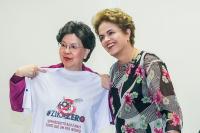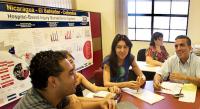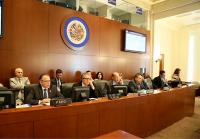4th RETS General Meeting: the different faces of the work of health technicians in Latin America

In the 20 countries that make up the International Network of Health Technicians Education (RETS), whose executive secretariat is headquartered at the Joaquim Venâncio Polytechnic School of Health (EPSJV/Fiocruz), there are major differences in relation to the characteristics of the institutions responsible for training of health technicians, as well as the modalities and degrees of education offered for these professionals. These multiple training and work experiences, with emphasis on primary health care (PHC), were highlights of the 4th RETS General Meeting, held on November 12th to 14th, in Rio de Janeiro, concomitantly with the 4th Ordinary Meeting of the Technical Health Schools Network of the Community of Portuguese-Speaking Countries (RETS-CPLP). RETS ' mission is to promote the articulation between institutions and organizations involved in the training and qualification of technical personnel in the health field in countries of the Americas, Africa, Asia, and Portugal.
Divided into two groups - Latin America and RETS-CPLP - participants gave short presentations on PHC and the work of health technicians in their respective countries, followed by reflections on ways of cooperating and strengthening the Network. According to the coordinator of the International Cooperation of EPSJV/Fiocruz, Ingrid D'avilla, RETS identified throughout its existence the lack of professional recognition and the political invisibility of the category of health technicians in the formulation of government policies and actions. "Despite initiatives such as the Mercosur I and II projects - research conducted jointly by institutions in Brazil, Uruguay, Argentina and Paraguay - there remains the difficulty of constructing a regional or even global definition for the expression 'health technicians', especially because of the historical difference between the countries involved in the educational level at which such training takes place", she said.
Within the scope of the RETS, the health technician is considered the one who carries out technical and scientific activities in the sector, from those carried out by auxiliary and community health agents to those that are developed by technicians of higher education. "We have many differences regarding professional offerings, internships, and public-private relations. But we also have in common the issue of low pay and insufficient resources that includes the workforce itself, as well as the lack of institutional integration", said Carlos Maurício Barreto, vice-director of Teaching and Information at EPSJV/Fiocruz, who added: "All this, increases the need for cooperation partnerships. If we are here, it is because this form of work can contribute to overcoming the various inequalities. One fact that unites us is the appreciation that we all make of the processes of formation. We believe that qualification is an essential dimension for overcoming the various obstacles we present. "
Brazilian experience

The presentation of Brazil was made by Marília Tolentino, from the Ministry of Health's Secretariat of Labor-Management and Health Education (SGTES), who spoke about the Network of Technical Schools of the Unified Health System (RET-SUS). According to her, the Network is consolidated as a reference in Brazil for the medium-level professional training in the health area and presents a relevant contribution to the development of vocational training processes for SUS workers, either through Initial and Continuing Training courses (Formação Inicial e Continuada - FIC), technical or post-technical, from the perspective of the National Policy of Permanent Education in Health (Política Nacional de Educação Permanente em Saúde - PNEPS). "The Technical Schools and Training Centers that make up the RET-SUS are public institutions that seek to meet the local training demands, primarily the middle-level workers who already work in the SUS health services. In all, we have 42 ETSUS in the country", she said.
Marília pointed out that in Brazil, Basic Care is developed with the highest degree of decentralization and capillarity, occurring in basic health units (Unidades Básicas de Saúde - UBS) that are installed near where people live, work and study. She explained that they play a central role in ensuring access to quality health care for the population. "One of the actions developed in Primary Care is the Family Health Strategy (Estratégia Saúde da Família - ESF), which is linked to the basic health units (UBS), and aims to intervene in factors that put health at risk, such as lack of physical activity, poor diet, tobacco use, among others", she explained, adding that Primary Care covers 65.57% of the Brazilian population.
Marília reported that in Brazil, the multi-professional teams of the ESF are made up of a doctor, a nurse, and up to three mid-level workers: Auxiliaries or Nursing Technicians who make bandages, collect material for examination and washing, administer medicines and vaccines, prepare and sterilize materials and other regulated activities for the exercise of the profession; the Community Health Agents (Agentes comunitários de saúde - ACS), responsible for home visits, in which the situation of the families and individuals in the territory is monitored with special attention given to harmed people, and routing to the reference health unit, when necessary; and the Oral Health Assistants and technicians who take care of the patient in oral health services and coordinate the maintenance and conservation of dental equipment, as well as accompany, support and develop oral health activities with other members of the team, seeking to approach and integrate health actions in a multidisciplinary way.
Latin America and its diversity
Unlikely in Brazil, the training of health technicians in Uruguay is predominantly carried out in university-level courses that, according to duration, confer the titles of graduates, technologists or technicians. There is also the formation of auxiliaries, in a few cases, generally as intermediate exits. The training of technical workers for the health area in that country is concentrated in the public sphere, at the University of the Republic of Uruguay (Udelar). "In the scope of medical technologies there are 18 regulated careers, such as pathology, medical cosmetology, and physiotherapy, and there are some other areas of nursing, dentistry, psychology, nutrition, and physical education", said Patrícia Manzoni, director of the University School of Medical Technologies EUTM/Udelar).

In Bolivia, PHC was implemented as a public policy in 2008, with the creation of the Community and Intercultural Family Health Program (SAFCI), according to Wilfredo Terrazas, from the Bolivian Japanese Technical Health School of Andean Cooperation. In 2013, the “Mi Salud” program guaranteed the population effective access to comprehensive health services. In addition to the Japanese Bolivian School, the National System of Technical Training in Health also counts on the National School of Health in the public sector, besides the private institutions that form the technicians in the middle level. "We have 12 training courses, with a workload of 2,400 hours, in the most varied areas, such as nursing, nutrition, X-ray and Environmental Health", he said. He added: "About 40% of the public health system staff is the health technician worker. And there is at least one nursing technician in each of our three thousand health facilities".
Gerardo Arturo Medina, director of the Training Center for Human Talent in Health at the National Service of Learning (SENA) in Bogotá, gave a very detailed explanation about the organization of the Colombian National Health System and how health technicians fit in this system, especially with regard to PHC teams. He highlighted several advances made in the country, but also noted that there are still many challenges to overcome.
In the case of Chile, Claudio Román, director of the Division of Management and Development of People of the Ministry of Health, pointed out that the country has 17,574,003 inhabitants, 76% or 13,397,471 people dependent on public services. The model is focused on primary care, focusing on family, community and intercultural health. "We have primary emergencies and rural posts, rural offices, and community health centers, family health centers and family and community hospitals, which bring together about 18 thousand health technicians", he said. According to him, the public health network also has 196 hospitals spread along the country, where 36,714 health technicians work.
Technical training in Chile can be carried out in two ways. Higher level technicians are trained in careers such as nursing, dentistry, and pharmacy, in Technical Training Centers, Professional Institutes and Universities. The only mid-level technician is the paramedic assistant, who must have a high school diploma and perform some training defined by the Ministry of Health.
Creation of RETS Centro América

During the meeting of Latin American countries, Luis Davies of the University of Costa Rica made a historic rescue of the proposal to create RETS Central America and the Caribbean, a new sub-network of RETS. In 2014, the School of Health Technologies of the University of Costa Rica (ETS/UCR), which hosted the first RETS Executive Secretariat, started the project. In 2016, the University requested the support of PAHO/WHO for the development, together with EPSJV/Fiocruz, of a workshop for the creation of the sub-network, within the scope of the 3rd Convention on Health Technologies, held in March 2017, in Cuba. During this event, a work plan was defined that pointed out the need to extend a more simplified mapping done by UCR previously.
Nowadays, four institutions are involved in the process, in addition to the EPSJV/Fiocruz: School of Medical Technologies of the Faculty of Medicine of the University of El Salvador, School of Health Technologies of the Faculty of Medicine of Costa Rica, Faculty of Health Technologies of Cuba (FATESA) and University of San Carlos of Guatemala. "Now we need to identify and confirm focal points for the creation of the network", Luis concluded.
Links and documents:
- Declaration of Rio de Janeiro
- Meeting Minutes
- Annex 1 - List of participants (coming soon)
- Annex 2 - Programming and Term of Reference (Portuguese, Spanish)
- Annex 3 - Work Plan RETS-CPLP 2018-2022 and Minutes 4th Ordinary Meeting of RETS-CPLP. (Portuguese)
- Annex 4 - Regional Action Plan for Latin America 2018-2022
- Annex 5 - RETS Communication Work Plan 2019-2022
- Annex 6 - Work Plan RETS 2019-2022
- 4th RETS General Meeting discusses primary health care (New)
- Seminar '40 years of Alma-Ata and the role of health technical workers in the implementation of universal health systems'
- From Declaration of Alma Ata to Declaration of Astana: advances or setbacks? (new)
- Presentation - Paulo Buss (Portuguese)
- Presentation - Isabel Duré (Spanish)
- Seminar's videos (Portuguese and Spanish)
- 4th RETS-CPLP Regular Meeting: an overview of the training and work of technicians in the Community countries (new)
- Presentation RETS-CPLP (Portuguese)
- Presentation Angola (Portuguese)
- Presentation Brazil (Portuguese)
- Presentation Cape Verde (Portuguese)
- Presentation Guinea Bissau (Portuguese)
- Presentation Equatorial Guinea (Spanish)
- Presentation Mozambique (Portuguese)
- Presentation Portugal (Portuguese)
- Presentation Timor Leste (Portuguese)
- The different faces of the work of health technicians in Latin America (new)
- Presentation RETS América Latina (Portuguese)
- Presentation Argentina (Spanish)
- Presentation Bolivia (Spanish)
- Presentation Brazil (Portuguese)
- Presentation Chile (Spanish)
- Apresentação Colombia (Spanish)
- Presentation Cuba (Spanish)
- Presentation El Salvador (Spanish)
- Presentation Paraguay (Spanish)
- Presentation Peru (Spanish)
- Presentation Uruguay (Spanish)



